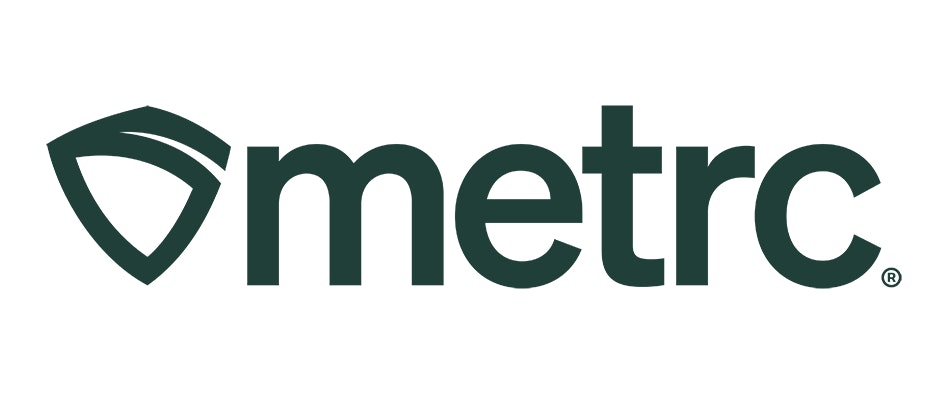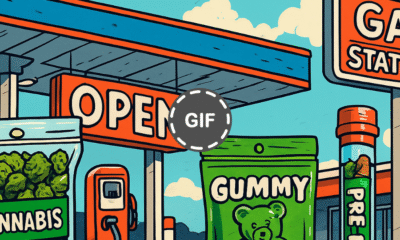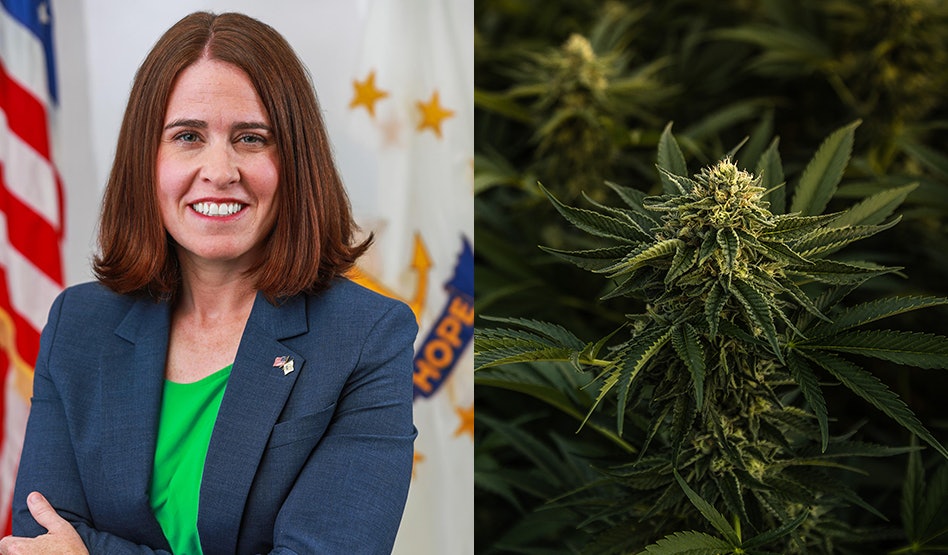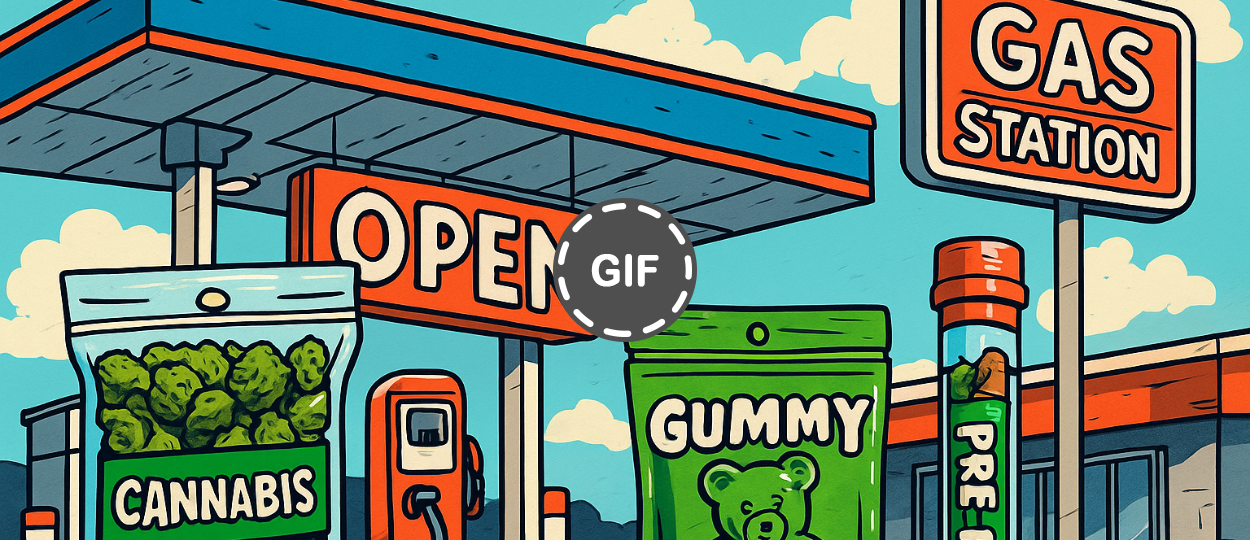featured
Metrc Announces In-Person Events in New York to Prepare Licensees For Track-and-Trace Implementation
Published
4 hours agoon

[PRESS RELEASE] – LAKELAND, Fla., Oct. 22, 2025 – Metrc, a leading provider of regulatory track-and-trace systems for highly regulated industries, announced it will host in-person roadshows throughout New York to help licensed businesses prepare for the state’s implementation of Metrc as the track-and-trace system of record.
The New York in-person events will include important information to help licensees understand the Metrc system, supporting a smooth implementation. Sessions will cover how to gain access to the system and set up your licensed business, as well as best practices for operational success.
Metrc will also conduct two live webinars for testing facilities on Oct. 23 and for third-party integrators on Oct. 29, and will host the following sessions, listed below, for all other license types. New York licensees can secure tickets, free of charge, at the links below.
Nov. 3, 2025 – Buffalo, N.Y.
Nov. 5, 2025 – Albany, N.Y.
Nov. 6, 2025 – Long Island, N.Y.
Nov. 7, 2025 – New York City
As part of Metrc’s phased onboarding approach, credentialing will be available for laboratory testing facilities as early as Oct. 31 and for all other license types on Nov. 7. All businesses will be required to use the Metrc system with a target date of Dec. 17.
For more information, visit: Metrc New York Partner Page and OCM Website.

Author: mscannabiz.com
MScannaBIZ for all you Mississippi Cannabis News and Information.
You may like
-


Tariffs And Visas Add To The Cannabis Industry’s Misery
-


Rhode Island Cannabis Chair Steps Down; Adult-Use Dispensary Awards Months Away
-


How America Accidentally Legalized Lab Cannabis
-


New Hampshire Lawmakers Announce Plans For Marijuana, Psychedelics And Hemp Bills For 2026 Session
-


Top Rhode Island Marijuana Regulator Steps Down Ahead Of Possible Campaign For Attorney General
-


Lifestyle Brand Cookies Launches in Brazil With Premium Wellness Products
featured
Tariffs And Visas Add To The Cannabis Industry’s Misery
Published
3 minutes agoon
October 22, 2025
Tariffs And Visa Add To The Cannabis Industry’s Misery, squeezing profits, talent, and innovation nationwide.
The U.S. legal cannabis industry has been suffering over the last two years under an indecisive federal government — and now it’s getting squeezed from two unexpected angles: Tariffs and Visas add to the cannabis industry’s misery. For businesses and workers alike, what once looked like a budding success story is showing greater turbulence.
The first punch comes via international trade policy. Many cannabis-adjacent businesses — from vape cartridge manufacturers to packaging suppliers and cultivation equipment importers — rely heavily on overseas inputs, especially from China. Recent U.S. tariffs on Chinese goods — in some cases raising rates to 30–50% or more — have forced costs up, and the ripple is hitting weed-industry players hard.
RELATED: The VFW Stands Up For Marijuana

What makes this especially tough for cannabis businesses: margins are already razor-thin, regulatory burdens are high, and the domestic supply chain just isn’t built out. Switching suppliers takes time; finding U.S.-based manufacturers meeting regulatory compliance is even harder.
Now consider the human side of the workforce. The immigration and “visa” side of the equation rarely gets front-page attention in cannabis, but it’s quietly important. The federal government still classifies cannabis (marijuana) as a Schedule I controlled substance, despite many states legalizing it. That creates complications for foreign nationals trying to work in or invest in cannabis-related businesses.
For example, non-U.S. citizens on visas or applying for visas risk denial or revocation if they have past cannabis use, or if they’re working or investing in the cannabis industry—even when it’s legal in the state. This means companies would otherwise recruit international talent, or rely on global investment, may find restrictions.
RELATED: Cannabis Mogul Appointed Ambassador To Middle East Country
At the same time, broader visa policy changes are making the environment more uncertain. Recent shifts on H-1B visas, fees, and work permits are complicating cross-border mobility for skilled workers.
The combination of higher input costs and a more restrictive workforce/immigration pipeline is a double whammy for cannabis entrepreneurs. It means:
- Higher retail prices or slimmer margins
- Supply chain disruption (imports delayed, domestic alternatives still catching up)
- Caution around hiring international talent or tapping global investment due to immigration uncertainty
- Potential slowdown in growth or innovation as more resources are diverted to coping
For millennial cannabis consumers and industry watchers: yes, you might start seeing slightly steeper prices or less product innovation. And for workers and founders: borders, visas, and trade policy are no longer side conversations — they’re central to whether the business thrives.
In short: the cannabis boom isn’t immune to macroeconomics and immigration policy. If anything, it’s among the more vulnerable sectors, since it straddles imports, regulation, and workforce mobility all at once.

Author: mscannabiz.com
MScannaBIZ for all you Mississippi Cannabis News and Information.
featured
Rhode Island Cannabis Chair Steps Down; Adult-Use Dispensary Awards Months Away
Published
1 hour agoon
October 22, 2025
The Rhode Island Cannabis Control Commission (CCC) is down to two commissioners after Chairperson Kimberly Ahern, Esq., announced Oct. 21 that she’s bowing out.
Gov. Dan McKee nominated Ahern for the position shortly after adult-use sales launched in December 2022 via seven existing medical dispensaries that have had a massive head start on market newcomers: The state has yet to award 24 new adult-use retail licenses established under 2022 legislation, the Rhode Island Cannabis Act, which McKee signed into law.
The Rhode Island Senate confirmed Ahern as the inaugural CCC chair in June 2023 to oversee the state’s licensed and regulated cannabis industry. She previously served as McKee’s deputy chief of staff.
“When nominated for this position, I shared a goal for the new commission: to regulate Rhode Island’s adult-use and medical cannabis markets in a manner that is safe, transparent and equitable,” Ahern wrote Tuesday in a resignation letter to McKee. “That commitment has guided every decision during my tenure. Serving the state in this capacity has been a privilege, and I am proud of what we have accomplished in such a short time.”
Ahern’s decision to step down from her CCC post comes ahead of a likely run for attorney general in Rhode Island’s 2026 race, the Rhode Island Current reported.
McKee announced Oct. 21 that Ahern’s last day with the commission was that same day, thanking her for establishing the state’s adult-use regulations, launching a social equity application certification process, and opening the current adult-use dispensary license application period that runs through 4 p.m. on Dec. 29.
“She helped stand up the commission from the ground up and ensured that Rhode Island’s cannabis industry was launched with public health, safety and fairness as priorities,” the governor said. “I’ve had the privilege of working closely with Kim since her time in my office, and I’ve seen firsthand her professionalism and commitment to public service. We wish her the very best.”
Ahern’s resignation came one day after the three-member CCC set a timeline to award the 24 adult-use dispensary licenses to new market entrants.
Beginning on Jan. 1, adult-use retail applicants will have 60 days (until March 2) to demonstrate they have final zoning approval from their local municipalities, or they will be disqualified from a lottery process.
The CCC, which now includes just commissioners Layi Oduyingbo and Robert Jacquard, will have until the end of March to review the applications to determine whether they qualify – working with municipalities on zoning requirements – before conducting a “hybrid random selection process” that’s tentatively scheduled for May 2026.
“We reserve the right to delay this process depending on several external factors outside of our control,” Ahern said at the CCC’s regular meeting on Oct. 20. “If we receive thousands of applications, it will be hard for us to do that.”
Since Rhode Island’s existing medical dispensaries transitioned to adult-use operations in December 2022, they’ve sold more than $323 million in cannabis, including $246.6 million in adult-use transactions, according to the Rhode Island Department of Business Regulation (DBR). The state’s seven medical cannabis compassion centers had to pay a $125,000 fee to the DBR to transition to adult-use sales as hybrid retailers.
While $323 million in cannabis sales over the course of nearly three years may seem like a small number compared to other adult-use states, Rhode Island’s hybrid dispensaries have averaged roughly $17 million in sales per month per store in 2024 and 2025: the highest in the nation. The average dispensaries in neighboring Massachusetts and Connecticut, for example, sold $4.8 million and $5.7 million per month per store in 2024, according to Cannabis Business Times data.
RELATED: 21 States With the Highest, Lowest Cannabis Sales Per Dispensary
The 24 new adult-use dispensary licenses will be awarded equally across six regulatory zones in Rhode Island, with each zone having one license reserved for a social equity application, one for a workers’ cooperative applicant, and two for open applicants.
Ahern reported during Monday’s CCC meeting that there are currently 94 entities interested in the state’s six available social equity licenses.
However, as of the meeting, the CCC had yet to receive an application for one of the 24 available licenses.
“As we even saw here this morning, there potentially might not need to be a need for a hybrid random selection process if there’s not more than one qualified applicant, to be determined based on the interest that comes at the end of this year,” Ahern said.

Author: mscannabiz.com
MScannaBIZ for all you Mississippi Cannabis News and Information.

…and still doesn’t know what to do about it
In 2018, Congress slipped a decimal point into law and, without meaning to, opened the gates to a new cannabis economy.
The Farm Bill’s definition of hemp (any cannabis plant with less than 0.3% delta-9 THC on a dry weight basis) was supposed to revive rope, seed oil, and maybe a wellness aisle or two. Instead, it gave birth to lab-cooked cannabinoids.
As expected, some people noticed what lawmakers didn’t: if hemp is legal so long as its delta-9 stays under the line, you can plant acres of it, strip out the CBD, and nudge the molecules into other substances. Delta-8. Delta-10. THCP. THC-O.
A new chemistry of cannabis, far from the natural experience of burning the flower.
The best part for these brave entrepreneurs is that it’s sort of legal.
In prohibition strongholds like Texas, you can’t buy a joint of real weed, but you can walk into a strip-mall vape shop and pick up hemp-derived highs. As always, the cracks in substance-based prohibition design gave birth to new productive practices.
What began as a dry legal definition mutated into an alchemy business that, for years, sat on gas station counters, truck stops, and e-commerce sites. A black-light market hiding in plain sight.
By 2024, the “intoxicating hemp” sector had already grown into a $28 billion market.
The Politics of a Decimal Point
Mitch McConnell thought he was saving Kentucky farmers when he wrote hemp into the Farm Bill. He pictured fields of fiber, a patriotic revival of rope and grain. Kentucky’s line against cannabis was firm, but hemp… that seemed safe.
Six years later, his decimal point has grown teeth. House Republicans like Mary Miller now want hemp narrowed to “naturally occurring, non-intoxicating cannabinoids,” a surgical strike aimed straight at delta-8. In the Senate, Debbie Stabenow wants to count “total THC,” closing off the raw biomass trade altogether. Draft appropriations language circulating in D.C. would simply erase hemp-derived products from the map.
This is highly unlikely to happen, given that the hemp lobby has risen together with its market.
I was at an academic congress recently in Rio de Janeiro, where a UN bureaucrat explained that the U.S. government, with carbon credits, aimed to kick off an economy that would eventually lead to the formation of lobbyists defending the policy that created them. Eventually, this would lock the policy in, which would be good for the planet, since every serious climate scientist agrees that if we don’t change course, we will see increasingly dramatic climate events. The problem is that, unfortunately, it didn’t happen. Economic interests weren’t enough to create a strong lobby, and the carbon credit market suffered when political winds shifted.
This is a good anecdote to reflect on hemp, where practically the exact opposite happened: the state unintentionally created a business and, when governments decided it was time to put it to rest, lobbyists were already powerful enough to resist. This happened in Florida, for instance, where the unlikely alliance between an anti-cannabis governor and a well-funded hemp lobby triumphed over the (much criticized) AM3.
These aren’t moral crusades so much as power struggles. On one side, the hemp lobby: processors, retailers, and growers, especially in the South, where cannabis is still illegal and hemp jobs are real. On the other hand, licensed cannabis operators argue the loophole is eating their market alive.
In California, the opposite situation played out: under Gavin Newsom, hemp-derived products were pushed out. Collateral damage included organic hemp wellness companies, suddenly criminalized overnight, and families that relied on hemp-based products for treating particularly rare diseases.
Conservative governors in farm states defend hemp. Liberal governors in cannabis states call for bans. Some sort of crop politics was formed.
Alchemy
Step away from the Capitol and the absurdity sharpens. A pre-roll infused with Delta-8 sits between Slim Jims and lottery tickets. Neon gummies, branded like candy, fall into shopping baskets with beer and gasoline. Online, cartridges ship across state lines in glossy packaging, indistinguishable from sneakers or supplements.
Also read: When Cannabis Brands Blur Into Youth Culture, Regulators Notice: Lessons From Tobacco’s Past
Before Newsom banned hemp-derived products, there were dozens of cannabis retailers in California moving from the legal cannabis space into hemp, including some big companies that decided to launch online stores.
Dispensary culture comes wrapped in vault doors, compliance manuals, and QR-coded lab results. Gas station weed thrives on convenience. No budtenders, no seed-to-sale, no tax lines. In half the country, the only cannabis you can buy freely is the one conjured through alchemy.
States Strike Back, States Look Away
The map is jagged. Colorado, New York, and Washington pulled intoxicating hemp into their cannabis frameworks: if it gets you high, test it, label it, tax it. Texas lawmakers voted to ban delta-8, only for a veto to keep the market alive, if shaky. Florida’s governor vetoed restrictions outright, delivering hemp lobbyists their biggest win against the biggest cannabis companies in the state, which burned around $100 million trying to make adult-use legal.
Elsewhere, compromises abound: Alabama licenses edibles but bans smokables. Nebraska toyed with criminal penalties so vague they might have hit ordinary consumers.
The Farm Bill legalized the workaround. In dry states, consumers buy it because there’s nothing else. In legal states, some drift to it because it’s cheaper, untaxed, and unburdened by 280E. The main justification for prohibiting these products in legal states has been the systematic targeting of children and phony labeling.
The real issue isn’t the cannabinoid; it’s the complete lack of oversight. When lab-made or hemp-derived products are pumped out with no testing, no dosing accuracy, and no accountability, consumers get burned and the entire plant takes the hit. But it doesn’t have to be that way. THCa flower grown with real genetics, properly lab-tested, labeled, and sold transparently, can be just as safe and effective as any dispensary product. The difference isn’t hemp versus cannabis. The difference is standards versus chaos.
Prohibition Doesn’t Work
There’s another path. Experts agree that prohibiting a molecule is ridiculous: scientists haven’t even been able to describe every cannabinoid in the plant.
What we know is a drop; what we don’t know is an ocean.
Regulators could admit that cannabinoids are cannabinoids, whether coaxed from hemp or cut from cannabis. One framework, one set of standards, one tax regime. License the labs, test the batches, label them clearly, and tax rationally.
Of course, that would mean dragging gas station weed out of the neon blur and into the same daylight as dispensary flower. It needs conviction and guts because entrenched interests have already been created.
Editor’s Note: High Times believes in safe access to all forms of cannabis. That’s why our own THCa line is lab-tested, terp-rich flower, not gas station mystery products. If policymakers are serious about consumer safety, this is what the standard should look like.
Cover image made with AI

Author: mscannabiz.com
MScannaBIZ for all you Mississippi Cannabis News and Information.

Tariffs And Visas Add To The Cannabis Industry’s Misery

Rhode Island Cannabis Chair Steps Down; Adult-Use Dispensary Awards Months Away

How America Accidentally Legalized Lab Cannabis

New Hampshire Lawmakers Announce Plans For Marijuana, Psychedelics And Hemp Bills For 2026 Session

Metrc Announces In-Person Events in New York to Prepare Licensees For Track-and-Trace Implementation

Top Rhode Island Marijuana Regulator Steps Down Ahead Of Possible Campaign For Attorney General

Lifestyle Brand Cookies Launches in Brazil With Premium Wellness Products

Alcohol companies lobby Congress on cannabis drinks (Newsletter: October 22, 2025)

Millennials Are Spending Big on Luxury Travel

Ohio Lawmakers Advance Bill To Scale Back Voter-Approved Marijuana Law And Impose Hemp Regulations

Data Confirms Cannabis Is Safer Than Alcohol

American Council of Cannabis Medicine Unveils Major Industry Initiative to Expand Medical Cannabis Access

Scientists Develop New Class Of CBD Using A Common Kitchen Spice—Not Cannabis

Evidence About Burning Mouth Syndrome And Cannabinoids

Raw Garden Acquires ‘California Love’ to Grow Clean Cannabis Movement

Rhode Island Marijuana Officials Approve Timeline For Awarding New Dispensary Licenses

‘Rent-a-License’ Scheme Highlights New York Cannabis’s Track-and-Trace Problem

Alcohol Industry Steps Up Lobbying On Hemp Drinks As Congress Debates THC Ban

Cannabis Mogul Appointed Ambassador To Middle East Country

Pennsylvania Senators Approve Bipartisan Cannabis Bill To Create New Regulatory Body

Ahead Of New Jersey Governor Election, GOP Candidate’s Comments On Marijuana As A ‘Gateway Drug’ Resurface

Urgent Action Needed To End US Marijuana Arrests

Supreme Court takes up cannabis & gun rights case (Newsletter: October 21, 2025)

What Winning Looks Like: The New Jersey Dispensaries Playing a Different Game

Alert: Department of Cannabis Control updates data dashboards with full data for 2023

Connecticut Appoints The US’s First Cannabis Ombudsperson – Yes there is a pun in there and I’m Sure Erin Kirk Is Going To Hear It More Than Once!

5 best CBD creams of 2024 by Leafly

Recreational cannabis on ballot for third time in South Dakota

EU initiative begins bid to open access to psychedelic therapies
New Study Analyzes the Effects of THCV, CBD on Weight Loss

Free delta-9 gummies from Bay Smokes

5 best autoflower seed banks of 2024 by Leafly

Discover New York’s dankest cannabis brands [September 2024]

May 2024 Leafly HighLight: Pink Runtz strain

Press Release: CANNRA Calls for Farm Bill to Clarify Existing State Authority to Regulate Hemp Products

5 best THC drinks of 2024 by Leafly

Local medical cannabis dispensary reacts to MSDH pulling Rapid Analytics License – WLBT

6 best CBD gummies of 2024 by Leafly

Curaleaf Start Process Of Getting Their Claws Into The UK’s National Health System – With Former MP (Resigned Today 30/5/24) As The Front Man

Horn Lake denies cannabis dispensary request to allow sale of drug paraphernalia and Sunday sales | News

5 best delta-9 THC gummies of 2024 by Leafly

Mississippi city official pleads guilty to selling fake CBD products

The Daily Hit: October 2, 2024

Nevada CCB to Accept Applications for Cannabis Establishments in White Pine County – “Only one cultivation and one production license will be awarded in White Pine County”

5 best THCA flower of 2024 by Leafly

Weekly Update: Monday, May 13, 2024 including, New Guide for Renewals & May Board meeting application deadline

6 best hemp pre-rolls of 2024 by Leafly

PRESS RELEASE : Justice Department Submits Proposed Regulation to Reschedule Marijuana
Trending
-

 California Cannabis Updates1 year ago
California Cannabis Updates1 year agoAlert: Department of Cannabis Control updates data dashboards with full data for 2023
-

 Breaking News1 year ago
Breaking News1 year agoConnecticut Appoints The US’s First Cannabis Ombudsperson – Yes there is a pun in there and I’m Sure Erin Kirk Is Going To Hear It More Than Once!
-

 best list1 year ago
best list1 year ago5 best CBD creams of 2024 by Leafly
-

 Business1 year ago
Business1 year agoRecreational cannabis on ballot for third time in South Dakota
-

 Business1 year ago
Business1 year agoEU initiative begins bid to open access to psychedelic therapies
-

 cbd1 year ago
cbd1 year agoNew Study Analyzes the Effects of THCV, CBD on Weight Loss
-

 Bay Smokes1 year ago
Bay Smokes1 year agoFree delta-9 gummies from Bay Smokes
-

 autoflower seeds1 year ago
autoflower seeds1 year ago5 best autoflower seed banks of 2024 by Leafly


